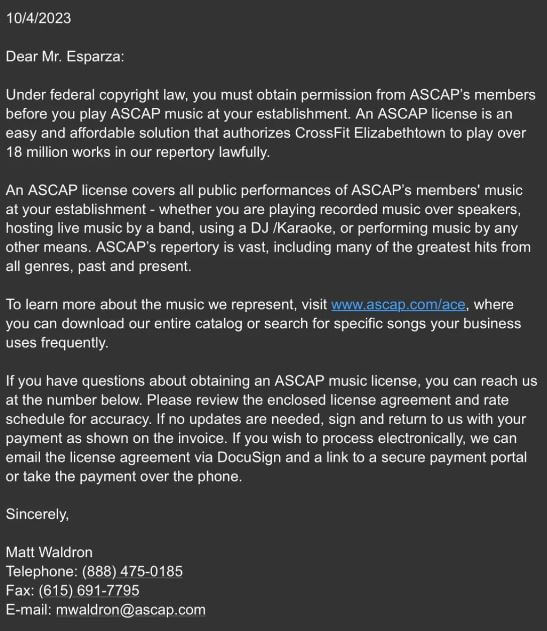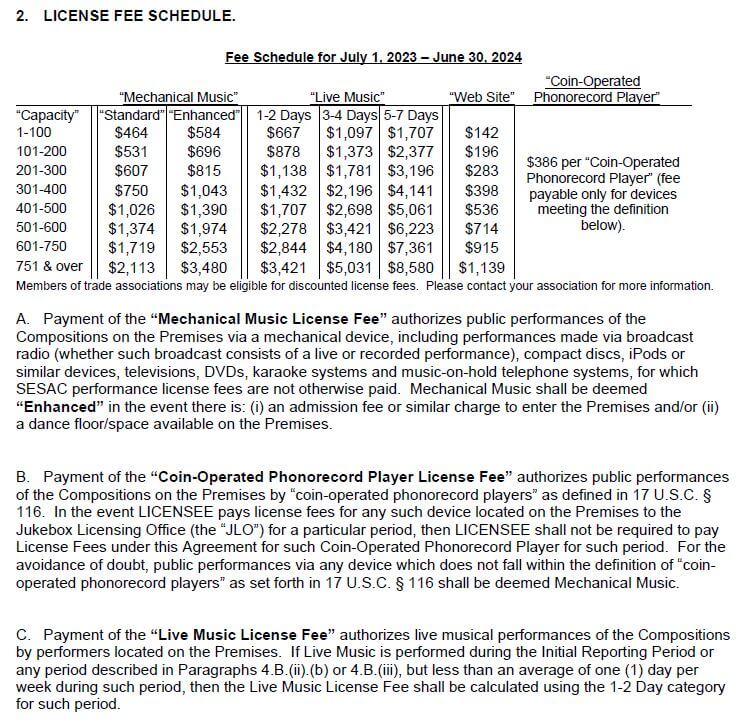Are Music Licenses A Scam?

If you operate an establishment in which the public can enter, and you play music, television, or prerecorded videos, you need to read this.
Who Needs a Lawsuit?
A Chamber member contacted us, wondering whether a string of solicitations from an organization SESAC was legitimate. SESAC claimed the member owed them thousands of dollars for “music licensing” and that this member’s establishment could be taken to court for copyright violations, especially in regards to hosting live music.
It sounded sketchy to me too, but here’s what I’ve discovered:
- Music licensing is a legal requirement under US copyright law.
- There are legitimate organizations, known as Performance Rights Organizations (PROs), who take local business owners to court for violations.
- Courts typically rule in favor of the PROs, potentially costing small businesses tens of thousands of dollars in fines, plus court costs.
PROs point out that they represent the interests of songwriters and publishers who must be fairly compensated for use of their artistic works. Businesses who show up on their radar, however, might feel like they’ve been grabbed by a pit bull. Phone calls and letters will precede a potential lawsuit. I’ve included some legal horror stories later in this article to show that, when it comes to dealing with a PRO company, ignorance is not bliss.
...and it’s not just bars and restaurants or live music venues affected by music licensing. Even fitness centers across the country are also targets for PRO outreach. Check out this email from ASCAP to a CrossFit gym in Elizabethtown, Kentucky.

Is your business exempt from music licensing requirements?
The first thing is to understand if your establishment is required to have a license to play music in your establishment, whether it’s live music, streaming, played through a television, or even played from a CD. Are you exempt?
Are you a Food Service or Drinking Establishment? If your establishment’s total operational footprint is less than 3,750 square feet*, you’re exempt from music licensure if:
- Music is played on 6 or fewer loudspeakers, and not more than 4 loudspeakers are in any 1 room.
- Televised / visual broadcasts appear on 4 or fewer audiovisual devices (like televisions or monitors), with no more than 1 audiovisual device in any one room.
- No audiovisual device can be greater than 55 inches (diagonal measurement).
- No direct charge is made to see or hear the transmission or retransmission.
- The transmission or retransmission is not further transmitted beyond the establishment where it is received.
- The transmission or retransmission is licensed by the copyright owner of the work so publicly performed or displayed.
Are You a Retail, Fitness, Dance Studio, and Other Business that isn’t a Food Service or Drinking Establishment? If your establishment’s total operational footprint is less than 2,000 square feet*, you’re exempt from music licensure if:
- Music is played on 6 or fewer loudspeakers, and not more than 4 loudspeakers are in any 1 room.
- Televised / visual broadcasts appear on 4 or fewer audiovisual devices (like televisions or monitors), with no more than 1 audiovisual device in any one room.
- No audiovisual device can be greater than 55 inches (diagonal measurement).
Are You Any Establishment that Hosts Live Music Events? No exemption for you, unless you can demonstrate that all works performed by artists are original or are in the public domain and not subject to copyright restrictions. The PROs won’t believe you, and they will claim you need a license anyway, according to most accounts.
*Parking lots don’t count in the square footage, but closets, kitchens, restrooms, and hallways do.
If you aren’t exempt, then you need a music license (or a way to stream licensed music, which I discuss later in this article).
What is a Music License?
A license is a contract allowing the unlimited, annual use of compositions and musical works within the catalog of a particular PRO. The Music Modernization Act made “blanket licensing” available beginning 2021, in part to free the U.S. Copyright office from being inundated with infringement claims.
What is a Public Performance?
What constitutes a public performance of music? According to the U.S. Copyright Law, a public performance of music is defined as, “Music performed in a place open to the public or at any place where a substantial number of persons outside of a normal circle of a family and its social acquaintances is gathered.”
That’s a lot of places, and that’s why the PRO’s reach out to many types of businesses, from coffee shops to strip clubs, from dance halls to dance clubs. Have people and music together? Chances are the PROs are looking for you.
Who are these “PROs”?
Three PROs (Performance Rights Organizations) dominate the music copyright space (and that includes television theme songs and music used in television commercials, by the way).
- Broadcast Music, Inc. (BMI). BMI is the largest PRO representing a catalog of 22.4 million songs. In a 2019 article, a BMI spokesperson claimed that one of every two songs played on the radio is licensed by BMI. As of November 2023, New Mountain Capital LLC became the majority shareholder of BMI.
- Society of European Stage Authors and Composers (SESAC). According to their About page, SESAC licenses the public performance of more than 1.5 million songs from such artists as Bob Dylan, Neil Diamond, The Cars, Rush, and Adele. Blackstone Inc. acquired SESAC in 2017. Blackstone is an investment management group whose largest shareholders are Vanguard Group, BlackRock Inc., and State Street, among other large investment groups.
- The American Society of Composers, Authors, and Publishers (ASCAP). Although designated as a not-for-profit organization, ASCAP is as aggressive as the other PROs. You may recall ASCAP for their stellar work going after the Girl Scouts of America in 1996 for singing copyrighted works, such as “Puff the Magic Dragon” and “God Bless America” around the campfire.
How do the PROs find you?
In the digital age, it’s not hard to find listings for businesses and their related business categories, like "bar" or "fitness center." Throw in a few Facebook or Google searches for “Live music near me” and a representative from one of the PROs has a solid call list to begin their “outreach process.” Your social media posts about the next band performance or open jam session are now evidence to be used against you. When an establishment ignores the calls or outright refuses to fork over the music license fee, then maybe you receive a letter or two, citing legal language. All this notice to you is tracked and will build the legal case against your establishment.
Maybe they need solid evidence that your establishment is playing unlicensed music. No problem! You can pay a willing informant to visit an establishment and track the songs they hear from the juke box, the overhead speakers, or from the live band. Then the informant provides the list of offending songs for use as prima facie evidence, which is a Latin phrase meaning “a slam dunk in court.”
Same goes for those fun Facebook live videos you might take of live performances of unlicensed songs. More evidence against your establishment, but with more emojis.
Why Stop at One Music License?
Let’s say you do the legal thing and purchase a music license from on these reputable PRO organizations. How do you know that all songs that will ever play through your speakers, or through the tv, or from your live bands will be covered by your single license? You don’t. Remember, BMI has the most songs in their line up, but not all the songs. ASCAP has a lot too, but not all. That’s why, if you buy one, you may need to purchase licenses from the other two PROs to cover your bar stool cushions.
Consider the sad case of the Pirate’s Den in Cincinnati, Ohio. Even pirates love Michael Jackson, but when the bar played ‘Rock With You’ ASCAP was there, soon launching a $90,000 lawsuit. The bar assumed (a Latin phrase meaning “sue me”) they were covered for all music use, because they already had purchased a music license, but it was with BMI, not ASCAP. They’d ignored ASCAP’s letters and phone calls more than 40 times over five years.
It’s All Fun & Games Until You Get Caught
Can you operate your establishment without a music license? Of course, until the lawsuit comes in.
Arizona copyright lawyer Steve Vondran advises businesses to purchase the music licenses when approached before matters escalate into a federal court case, which is very expensive and can be bad for branding.
How Much Does It All Cost?
The licensing fee for eating and drinking establishments costs a minimum of $378 a year, according to BMI's website, depending on the size of the establishment, the type of music being played and how often music is performed, whether there’s a jukebox, cover charges, dancing, etc. The maximum annual fee is $11,286.
And that’s just for BMI.
ASCAP licensing starts at about $730. For a SESAC license, it looks like prices start around $650 per year, based on correspondence with one local establishment recently approached by SESAC. That totals an estimated $1,500 per year for basic license coverage for all three PROs.
Here’s an example of SESAC’s 2023-2024 rate chart.

Skipping the Music License is a Crap Shoot
Here are some horror stories from small business owners around the country:
- San Francisco bar and venue taken to federal court for playing 3 unlicensed songs [2023]
- St. Paul, Minnesota bar’s music licensing fee jumped to $10,000 per year. They challenged, and then they had to pay it all anyway, plus court costs. [2019]
- Two Portland, Oregon Bars Sued for Copyright Infringement by ASCAP, seeking upwards of $30,000. [2019]
- Port Angeles, Washington bar settles with ASCAP for $8,500 for karaoke music. [2018]
- Gloucester Township, New Jersey restaurant and bar played 17 unlicensed karaoke songs. The first copyright violation was George Thorogood’s “Bad to the Bone.” BMI filed for $3,300 per song – or $56,100 plus BMI’s legal expenses. [2018]
- Oklahoma City hotel sued by BMI for playing unlicensed music [2016]
- Bridgeport Connecticut brick oven restaurant dished out $18,000 to BMI for DJ who played unlicensed music. [2015]
- Cleveland, Ohio bar host live classic rock cover band, including “Bad Moon Rising,” “Brown Eyed Girl,” “Jessie’s Girl,” and the perennial classic, “Mustang Sally.” Gets sued by BMI for $1.5 million, plus attorney fees. BMI adds insult to injury by seeking injunction to prevent the venue from hosting live music. This case, presumably settled out of court, is an example that it is the establishment responsible for licensing music, not the live band. [2014]
- Rochester, Minnesota nightclub pays BMI $25,000 for unlicensed music, closed 2 years later. [2013]
- Dozens of Ohio businesses sued: including one bar ordered to pa BMI $30,000 for playing “Brown-Eyed Girl” and “I Walk the Line.” [2012]
- Some venues in Vermont simply gave up. They stopped hosting live music and jam sessions at the Shoreham Inn (open only seasonally) and the Three Bean Café, a 15-seat coffee shop. [2012]
- North Carolina restaurant ordered to pay BMI $30,000 for playing 4 unlicensed songs. [2011]
- Athens, Georgia night club performers play unlicensed songs from the Rolling Stones and Creedence Clearwater Revival, and it’s the venue who suffers. [2006]
But I Pay for an Ad-Free Streaming Service! Am I Exempt?
Your paid subscription to Spotify or Apple or Pandora has nothing to do with music licensing. In fact, Spotify’s terms of service explicitly state that their streaming service should not be played in commercial establishments.
“As laid out in our Terms and Conditions, Spotify is only for personal, non-commercial use.”
Same with Pandora:
“Due to the terms of our music licenses, the consumer version of the Pandora service (including Pandora Plus and Premium) is only intended for personal non-commercial use.”
There are options for streaming music to maintain the vibe of your awesome shop.
Some streaming services have their own licensing agreements with the PROs; for example, if you have a subscription with SiriusXM Business, they’ve got you covered with licenses for all three PROs for streaming music (but not live music).
Other streaming options for business include:
- Soundmachine
- Business DIRECTV
- Mood Media (formerly known as Muzak)
- Soundtrack Your Brand
But remember, a subscription with even one of these streaming options does not cover the rights needed for the performance of live music and karaoke songs.
This article is not intended as legal advice. Please consult your attorney and copyright statutes to determine how or if to proceed with music licensing. The Austin Area Chamber of Commerce provides this information to businesses for informational purposes only.

Chaunce Stanton
Director of Marketing & Communications
Austin Area Chamber of Commerce

